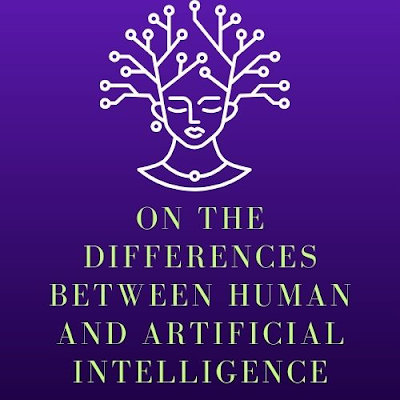In an era defined by rapid technological advancement, Artificial Intelligence (AI) stands as a beacon of innovation, revolutionizing the way we perceive and interact with the world around us. At its core, AI embodies the culmination of human ingenuity, striving to replicate the intricate workings of the human mind within the realm of machines. From its humble origins in expert systems to the awe-inspiring capabilities of modern deep learning algorithms, AI has transcended mere computation to become a driving force shaping the landscape of the 21st century. This article focuses on the differences between human and artificial intelligence.
What is Artificial
Intelligence?
Artificial
intelligence (AI) refers to the simulation of human intelligence processes by
computer systems. These processes include learning (the acquisition of
information and rules for using that information), reasoning (using rules to
reach approximate or definite conclusions), and self-correction. Particular
applications of AI include expert systems, speech recognition, and machine
vision. AI can be categorized as either narrow AI (also known as weak AI),
which is designed for a particular task (such as facial recognition or internet
searches), or general AI (also known as strong AI or AGI), which exhibits
human-like intelligence and can perform any intellectual task that a human can.
Importance of
Artificial Intelligence in the 21st Century:
The importance
of artificial intelligence (AI) in the 21st century is profound and
far-reaching, impacting various aspects of our lives and society. Here are
several key reasons why AI is crucial in the 21st century:
Automation and
Efficiency: AI technologies enable automation
of tasks across various industries, leading to increased efficiency,
productivity, and cost savings. From manufacturing and logistics to customer
service and finance, AI-powered automation streamlines processes and reduces
manual labor.
Innovation and
Discovery: AI facilitates innovation and
discovery by analyzing vast amounts of data, identifying patterns, and
generating insights that humans may overlook. AI-driven technologies have the
potential to accelerate scientific research, drug discovery, and technological
advancements in areas like healthcare, energy, and environmental conservation.
Enhanced
Decision Making: AI systems can analyze complex data
sets and provide valuable insights to support decision making in diverse
fields, including business, healthcare, finance, and governance. Organizations
can make informed decisions faster and more accurately by leveraging AI
algorithms for predictive analytics and risk assessment.
Personalization
and Customization: AI enables personalized experiences
and tailored solutions by analyzing individual preferences, behaviors, and
needs. From personalized recommendations in e-commerce to adaptive learning
platforms in education, AI-driven personalization enhances user experiences and
engagement.
Improving
Healthcare: AI technologies have the potential
to revolutionize healthcare delivery by enabling early disease detection,
personalized treatment plans, and predictive analytics for public health
initiatives. Machine learning algorithms can analyze medical images, genomic
data, and patient records to assist healthcare professionals in diagnosis,
treatment selection, and patient care management.
Addressing
Societal Challenges: AI has the potential to address
some of the most pressing societal challenges, including poverty, inequality,
climate change, and resource scarcity. AI-powered solutions can optimize
resource allocation, improve urban planning, enhance disaster response, and
support sustainable development initiatives.
Ethical and
Societal Implications: As AI
technologies continue to advance, it is essential to consider the ethical and
societal implications of their deployment. Issues such as bias in algorithms,
privacy concerns, job displacement, and AI-driven misinformation require
careful consideration and proactive measures to mitigate risks and ensure
responsible AI development and deployment.
Overall,
artificial intelligence plays a transformative role in shaping the trajectory
of human progress in the 21st century, offering immense opportunities for
innovation, efficiency, and societal advancement, while also presenting
challenges that must be addressed thoughtfully and responsibly.
Differences
between Artificial Intelligence and Human Intelligence :
Artificial
intelligence (AI) and human intelligence differ in several key aspects:
1/- Origins and
Nature:
Artificial
Intelligence (AI): AI is created by humans through
programming and algorithms. It simulates human-like intelligence in machines or
computer systems to perform specific tasks.
Human
Intelligence: Human intelligence is innate to
humans and is the result of complex biological processes in the brain. It
encompasses cognitive abilities such as reasoning, problem-solving, creativity,
and emotional intelligence.
2/- Learning
and Adaptation:
Artificial
Intelligence (AI): AI systems learn and adapt through
machine learning algorithms, neural networks, and data analysis. They improve
performance over time based on the data they receive and the feedback provided.
Human
Intelligence: Humans learn and adapt through a
combination of innate capabilities, education, experiences, and social
interactions. They have the ability to generalize knowledge across different
domains and apply it creatively to new situations.
3/- Creativity
and Emotional Intelligence:
Artificial
Intelligence (AI): While AI can generate creative
outputs such as art, music, or literature, it lacks the depth of human
creativity and emotional understanding. AI systems may mimic emotional
responses, but they do not possess genuine emotions or empathy.
Human
Intelligence: Humans demonstrate creativity in
various forms, including artistic expression, problem-solving, and innovation.
They also exhibit emotional intelligence, which involves recognizing,
understanding, and managing emotions in oneself and others.
4/- Flexibility
and Contextual Understanding:
Artificial
Intelligence (AI): AI systems excel in performing
specific tasks within well-defined parameters, but they may struggle with tasks
that require flexibility, contextual understanding, and common sense reasoning.
Human
Intelligence: Humans exhibit flexibility and
adaptability in diverse situations, understanding context, ambiguity, and
nuance. They can apply knowledge from one domain to another, solve problems
creatively, and navigate complex social interactions.
5/- Autonomy
and Consciousness:
Artificial
Intelligence (AI): AI operates based on pre-defined
algorithms and rules, and it lacks consciousness or self-awareness. AI systems
do not possess autonomy or intentions; they function as programmed by humans.
Human
Intelligence: Human consciousness involves
self-awareness, introspection, and subjective experience. Humans have autonomy
and agency, making decisions based on values, beliefs, and desires.
While AI has
made significant advancements and can outperform humans in certain specialized
tasks, it still falls short of replicating the full spectrum of human
intelligence and capabilities. Human intelligence remains unparalleled in its
depth, flexibility, creativity, and emotional richness.
Artificial Intelligence and Self-Learning :
The
relationship between Artificial Intelligence (AI) and Self-Learning is
symbiotic and interconnected:
AI Facilitates
Self-Learning:
Artificial
intelligence technologies enable self-learning systems by providing the
computational framework and algorithms necessary for processing vast amounts of
data, identifying patterns, and extracting insights. Self-learning systems
utilize AI techniques such as machine learning, deep learning, and
reinforcement learning to improve their performance over time based on
experience.
Self-Learning
Enhances AI Capabilities:
Self-learning
mechanisms empower AI systems to continuously adapt and improve without
explicit human intervention. By autonomously analyzing data, identifying
trends, and refining algorithms, self-learning enhances the capabilities and
efficiency of AI systems. This iterative process leads to more accurate
predictions, better decision-making, and increased effectiveness across various
applications.
Feedback Loop:
The
relationship between AI and self-learning forms a feedback loop where AI
technologies enable self-learning mechanisms, and self-learning, in turn,
enhances AI capabilities. As AI systems learn from data and user interactions,
they refine their algorithms and models, leading to iterative improvements in
performance. These improvements, in turn, enable AI systems to facilitate more
advanced self-learning processes.
Applications:
In practical
terms, the integration of AI and self-learning has numerous applications across
various domains. For example, in healthcare, AI-powered diagnostic systems can
continuously learn from new medical data and diagnostic outcomes to improve
accuracy and effectiveness over time. Similarly, in finance, AI-driven trading
algorithms can adapt to changing market conditions and refine trading
strategies through self-learning mechanisms.
Challenges and
Considerations:
While the
synergy between AI and self-learning offers significant opportunities for
innovation and advancement, it also presents challenges and considerations.
Issues such as data privacy, algorithmic bias, and ethical implications of
autonomous learning require careful attention and mitigation strategies to
ensure responsible development and deployment of AI systems.
In summary, the relationship between Artificial Intelligence and Self-Learning is dynamic and mutually reinforcing. AI technologies empower self-learning systems to autonomously improve and adapt, while self-learning mechanisms enhance the capabilities and effectiveness of AI systems, leading to continuous innovation and advancement.
Conclusion:
As we navigate the complexities of an increasingly interconnected world, the symbiotic relationship between Artificial Intelligence and Self-Learning emerges as a testament to human ingenuity and technological progress. Together, they herald a future where innovation knows no bounds, empowering us to unlock new frontiers of knowledge and understanding. Yet, as we marvel at the potential of AI and self-learning systems, we must tread carefully, mindful of the ethical implications and societal responsibilities that accompany such profound advancements. For in the delicate balance between progress and prudence lies the promise of a future where Artificial Intelligence not only augments our capabilities but also enriches the very fabric of human existence.


